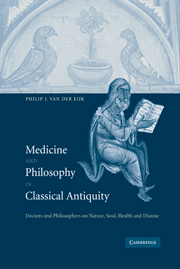 Medicine and Philosophy in Classical Antiquity
Medicine and Philosophy in Classical Antiquity Book contents
- Frontmatter
- Contents
- Acknowledgements
- Note on translations
- Note on abbreviations
- Introduction
- I HIPPOCRATIC CORPUS AND DIOCLES OF CARYSTUS
- II ARISTOTLE AND HIS SCHOOL
- III LATE ANTIQUITY
- 10 Galen's use of the concept of ‘qualified experience’ in his dietetic and pharmacological works
- 11 The Methodism of Caelius Aurelianus: some epistemological issues
- Bibliography
- Index of passages cited
- General index
11 - The Methodism of Caelius Aurelianus: some epistemological issues
Published online by Cambridge University Press: 22 September 2009
- Frontmatter
- Contents
- Acknowledgements
- Note on translations
- Note on abbreviations
- Introduction
- I HIPPOCRATIC CORPUS AND DIOCLES OF CARYSTUS
- II ARISTOTLE AND HIS SCHOOL
- III LATE ANTIQUITY
- 10 Galen's use of the concept of ‘qualified experience’ in his dietetic and pharmacological works
- 11 The Methodism of Caelius Aurelianus: some epistemological issues
- Bibliography
- Index of passages cited
- General index
Summary
Caelius Aurelianus' Methodism is often taken for granted. Yet the question may be asked how profoundly, pervasively and consistently Methodist doctrine and methodology is applied in Caelius' work. In this chapter I will attempt to answer this question with regard to some epistemological principles of Methodism as they are known to us from Soranus and from Caelius himself; and I will consider whether the difficulties that arise here are just apparent or amount to genuine inconsistencies, and, if the latter, whether these are to be explained as the result of a development in Methodism after Soranus or as tensions inherent in Methodist medicine as such. In so doing, I will treat Caelius Aurelianus (not Soranus) as the author of Acute Affections (Acut.) and Chronic Affections (Chron.). This is not to deny Caelius' dependence on Soranus – a dependence which is probably great, but in the absence of most of Soranus' work impossible to assess – but should leave room, at least theoretically, for Caelius' own contribution, whether that merely consisted of translating and partially rearranging Soranic material or of substantial revision with additions and omissions of his own.
To be sure, there is no question about Caelius' actually belonging to the Methodist school, to which he frequently refers as ‘our sect’ and whose doctrines he often presents as the standard for his therapeutic instructions.
- Type
- Chapter
- Information
- Medicine and Philosophy in Classical AntiquityDoctors and Philosophers on Nature, Soul, Health and Disease, pp. 299 - 327Publisher: Cambridge University PressPrint publication year: 2005
- 2
- Cited by


